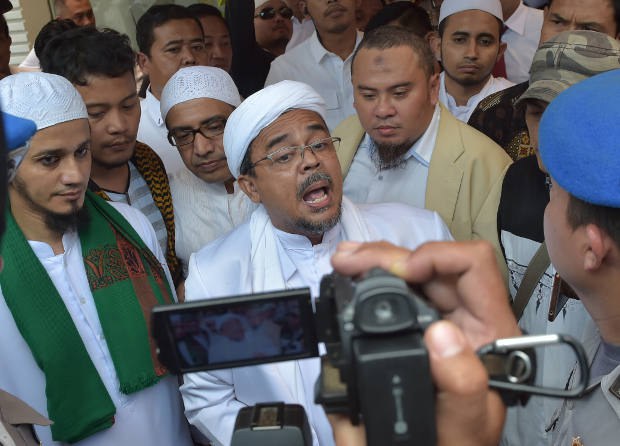Hardline Indonesian Cleric Rizieq Shihab Questioned in Treason Case
2017.02.01
Jakarta
 Rizieq Shihab speaks to reporters outside Jakarta police headquarters, Jan. 23, 2017.
Rizieq Shihab speaks to reporters outside Jakarta police headquarters, Jan. 23, 2017.
Updated at 9:36 a.m. ET on 2017-02-02
Indonesian police on Wednesday questioned Rizieq Shihab, leader of the hardline Islamic Defenders’ Front (FPI), in connection with an alleged plot to occupy parliament and oust the president during a rally he organized.
Rachmawati Soekarnoputri, the sister of a former president, and two retired generals were among eight people arrested on suspicion of treason hours before a Dec. 12 rally when about 200,000 people gathered in the capital to demand the arrest of Jakarta’s governor for alleged blasphemy against Islam.
Rizieq was a leader of that rally as well as a march the month before against Jakarta Gov. Basuki “Ahok” Tjahaja Purnama that ended in a riot outside the presidential palace.
“In regard to meetings, it is true that Mrs. Rachmawati paid a visit to my house. I paid a visit to hers, as well,” Rizieq told reporters at police headquarters on Wednesday.
“Mrs. Rachmawati also attended the Nov. 4 rally and we met in a number of Islamic and nationalist mass organizations’ events,” he said.
“But there were no talks about treason during all those meetings, nor were we plotting treason and any other unlawful actions. Those meetings were mainly related to the Nov. 4 and Dec. 12 rallies.”
Police also questioned former FPI spokesman Munarman and Bachtiar Nasir – the head of another group that helped organize the rallies, the National Movement to Protect the MUI Fatwa (GNPF MUI). The questioning lasted about seven hours.
Legal troubles
Rizieq Shihab is facing legal problems after months at the forefront of a mass Muslim movement demanding the Jakarta governor be prosecuted for blasphemy. Ahok, an ethnic Chinese Christian, is up for election on Feb. 15.
The former deputy governor of Jakarta ascended to the top spot when then-Jakarta Governor Joko Widodo was elected president of Indonesia in 2014.
On Monday, West Java police declared Rizieq a suspect for insulting the state ideology Pancasila by asserting that founding president Soekarno had placed belief in God at the bottom of the list of five core national principles. If guilty, he faces up to four years in prison.
At least eight police reports such as inciting hatred against a certain group and insulting the Jakarta Police Chief M. Iriawan for being “a general with the brain of a neighborhood watchman” have been filed against Rizieq since October.
He was also questioned by police last week over allegations he triggered public unrest by claiming the new rupiah banknotes featured a hammer and sickle, a logo of the defunct Indonesian Communist Party (PKI) that is banned in Indonesia.
Wiretapping?
Ahok, whose blasphemy trial began in December, has repeatedly said he never intended to offend Muslims during a speech in the Thousand Islands regency near Jakarta on Sept. 27, when he cited Surah Al-Maida Verse 51 from the Quran. Some have interpreted the passage as barring Muslims from having non-Muslim leaders.
Former president Susilo Bambang Yudhoyono, whose son is a candidate for Jakarta governor, responded angrily Wednesday to an assertion by one of Ahok’s lawyers that he had asked the head of the Indonesian Ulema Council (MUI) in a telephone call to issue a fatwa condemning Ahok’s comment.
“If it’s true my conversation with Ma’ruf or anyone else was tapped without legal authorization, that’s illegal,” Yudhoyono, president from 2004 to 2014, said in a press statement Wednesday, referring to MUI leader Ma’ruf Amin.
In his own statement, Ahok denied the electronic eavesdropping and said the information came from a news article on Oct. 7.
Past convictions
If any of the current allegations against him lead to a conviction, it would not be the first prison sentence for Rizieq.
In July 2003, the firebrand cleric was sentenced to seven months in prison for insulting police during a television talk show. In October 2008, the Central Jakarta court convicted him of inciting violence during a peaceful interfaith rally at the National Monument and sentenced him to 18 months.
Rights watchdog group Setara Institute Deputy Chairman Bonar Tigor Naipospos said FPI’s activities and intolerance dwindled following Rizieq’s previous convictions.
“It showed that there is a correlation. If the state is willing to enforce the law, it would reduce the number of intolerance acts, because the main actors are from that group,” Bonar told BenarNews recently.
Bandung’s Universitas Padjajaran political analyst Idil Akbar said prosecuting Rizieq would not suppress the group’s activities.
“I predict that the potential is still there,” he said, adding that it could escalate because Rizieq’s followers might think the cleric is being persecuted.







